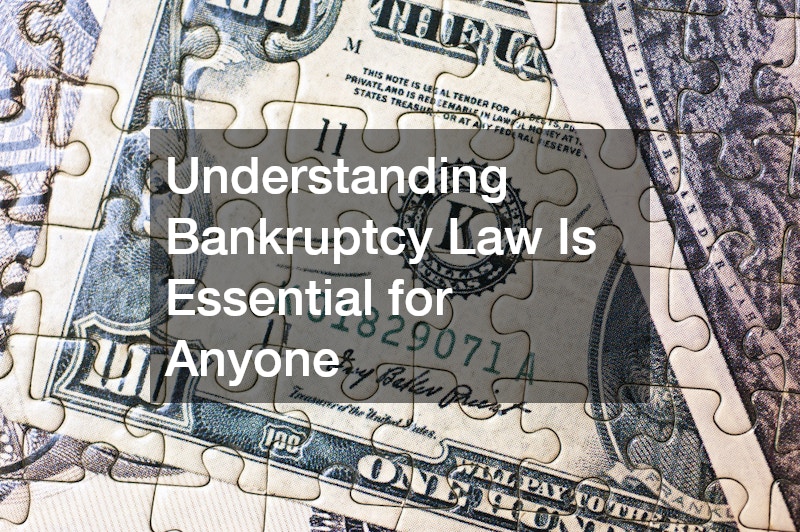Bankruptcy law can be a complex and daunting field for many individuals and businesses. Understanding the basics and common concerns can help navigate the process with more confidence. This article provides three helpful tips about bankruptcy law by addressing some of the most frequently asked questions on the topic.
What is Bankruptcy, and How Does It Work?
Definition and Types of Bankruptcy
Bankruptcy is a legal proceeding designed to help individuals or businesses eliminate or reorganize their debts under the protection of the bankruptcy court. The primary types of bankruptcy include Chapter 7, Chapter 11, and Chapter 13, each catering to different needs and situations.
Understanding these variations is crucial for determining which type best suits an individual’s or business’s financial circumstances.
Chapter 7 bankruptcy, known as liquidation bankruptcy, involves the sale of a debtor’s non-exempt assets to pay creditors. Chapter 11, often used by businesses, allows reorganization to keep the business operational while repaying creditors over time. Chapter 13 provides a repayment plan for individuals with regular income, allowing them to keep property and repay debts within a three to five-year period.
Bankruptcy offers a fresh start for individuals overwhelmed by debt; however, it can have long-lasting impacts. The choice between filing under Chapter 7, Chapter 11, or Chapter 13 depends on a careful assessment of one’s financial situation. Individuals must weigh the immediate relief against potential long-term consequences like impacts on future creditworthiness.
The Bankruptcy Process
The bankruptcy process begins with a petition filed in a bankruptcy court, usually accompanied by detailed information about assets, debts, and income. After filing, there’s an automatic stay that prevents creditors from continuing collection efforts, providing temporary relief to the debtor. A bankruptcy trustee is appointed to oversee the case, ensuring that all procedures adhere to bankruptcy laws.
During court proceedings, the debtor must attend a meeting of creditors where they are required to answer questions about their finances and bankruptcy petition. The trustee evaluates the debtor’s assets to determine which can be liquidated or used to repay creditors, as well as ensure compliance with the repayment plan in Chapter 13 cases. The court’s ruling will either discharge eligible debts, allowing the debtor to move forward debt-free in Chapter 7, or approve a repayment plan in Chapters 11 and 13.
Bankruptcy laws mandate strict adherence to the process, and any missteps can jeopardize the outcome for the filer. Successfully navigating bankruptcy involves transparency and cooperation with the court and trustee. Individuals are encouraged to seek legal advice to better understand the intricacies of their specific case.
Who is Eligible to File for Bankruptcy?
Eligibility Criteria
To file for bankruptcy, specific eligibility criteria must be met, varying by the type of bankruptcy being pursued. Chapter 7 eligibility requires passing a means test to prove insufficient income to repay debts, while Chapter 11 is generally available to businesses. Chapter 13 is available to individuals with a regular income who can adhere to a repayment plan.
Eligibility for Chapter 7 involves examining a filer’s monthly income against the median for their household size in their state. If the income is below the state median, they are eligible for Chapter 7; otherwise, further calculations determine eligibility. For Chapter 13, debt limits apply, and individuals must have a steady income to support the proposed repayment plan.
Meeting eligibility requirements ensures that the bankruptcy application process proceeds smoothly and increases the chances of favorable outcomes. It’s important for potential filers to seek guidance to prevent misunderstandings and ensure compliance with legal standards. An attorney or financial advisor can provide clarity and ensure that a filer strategically approaches the filing process.
Means Testing
The means test is a critical tool used to determine whether a debtor qualifies for Chapter 7 bankruptcy by examining their financial status. It involves a two-step analysis: first, comparing the debtor’s average income over six months to their state’s median income for a similar household size. If the debtor’s income is below the median, they automatically qualify for Chapter 7; if not, further examination of expenses and debts is conducted.
Debtors whose income exceeds the median must calculate their disposable income by subtracting allowable expenses to assess whether Chapter 7 is appropriate. The means test is designed to prevent abuse of the bankruptcy system by ensuring that only those truly unable to repay their debts qualify for Chapter 7. Passing the means test is a significant step towards obtaining debt relief through Chapter 7 bankruptcy.
Filing unnecessary Chapter 7 cases is deterred by this stringent means test, channeling those capable of repayment towards Chapter 13. The means test calculations can be complex, so professional advice is recommended to ensure accuracy. As laws and thresholds frequently change, staying up-to-date is essential for accurate eligibility assessment.
Understanding bankruptcy law is essential for anyone considering this option to relieve debt burdens. By exploring what bankruptcy is, who is eligible, and the alternatives available, individuals can make more informed decisions. Contact bankruptcy law firms to get all the help you need.
.





